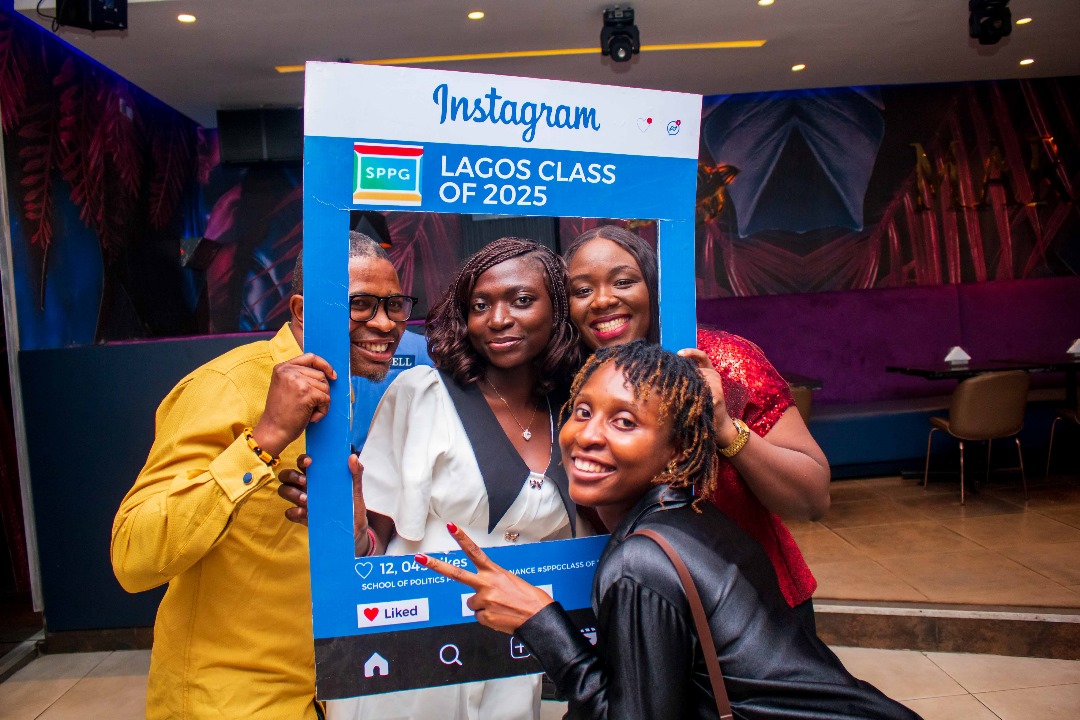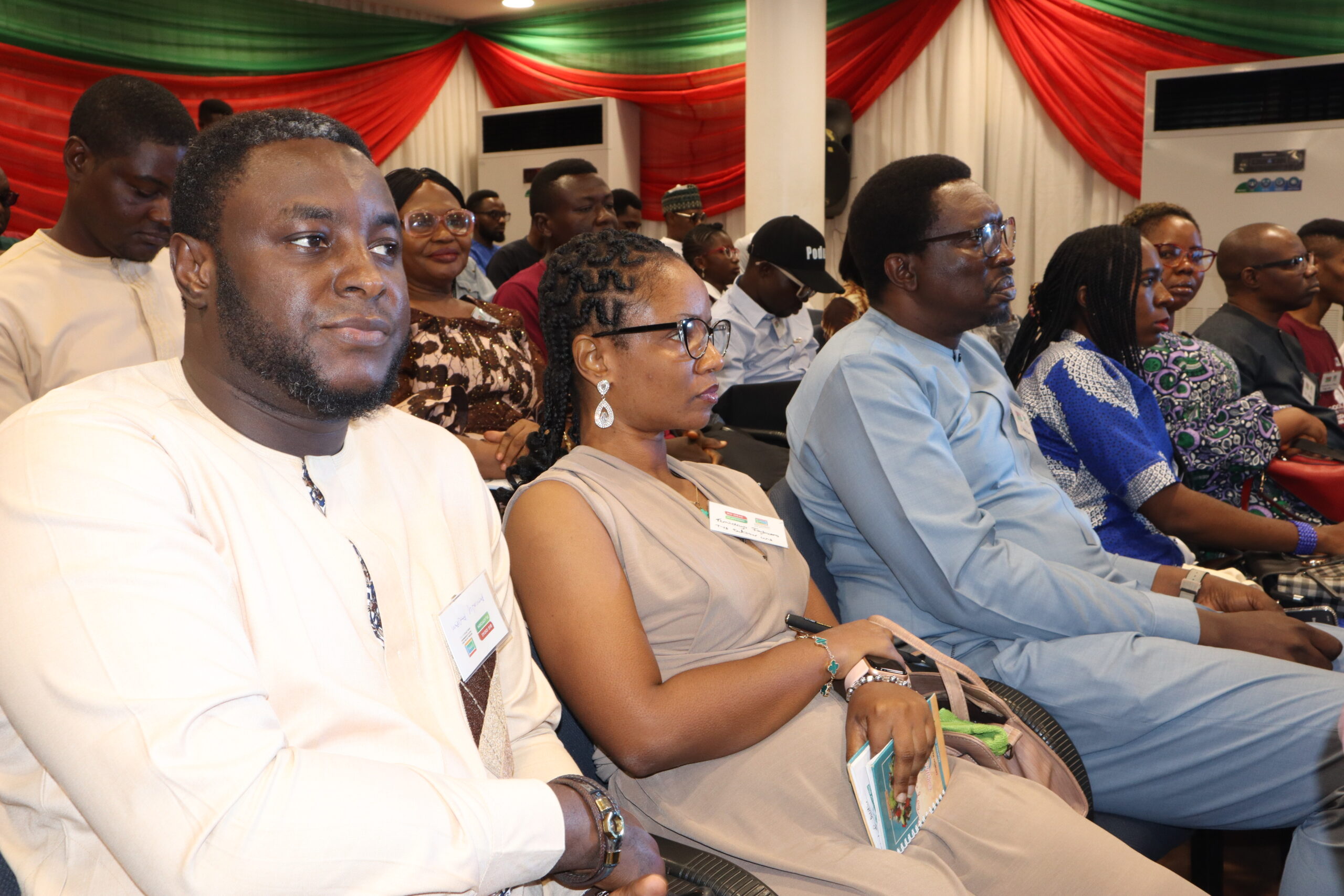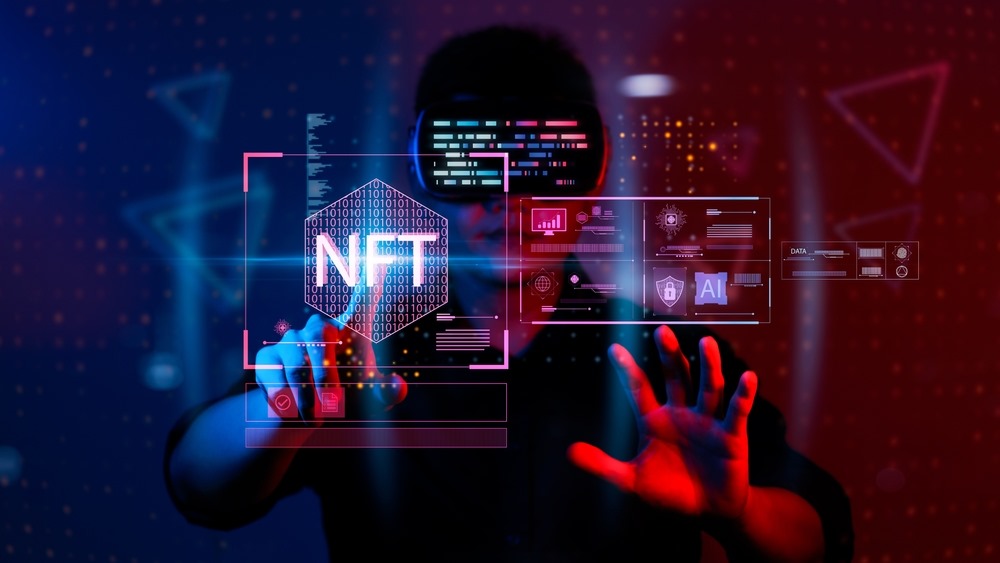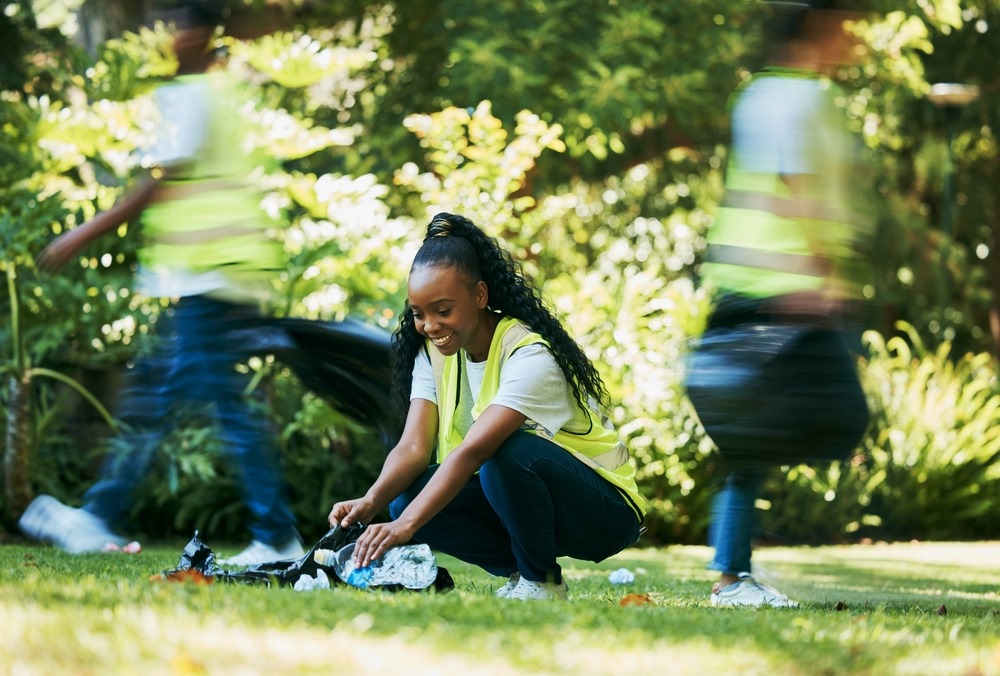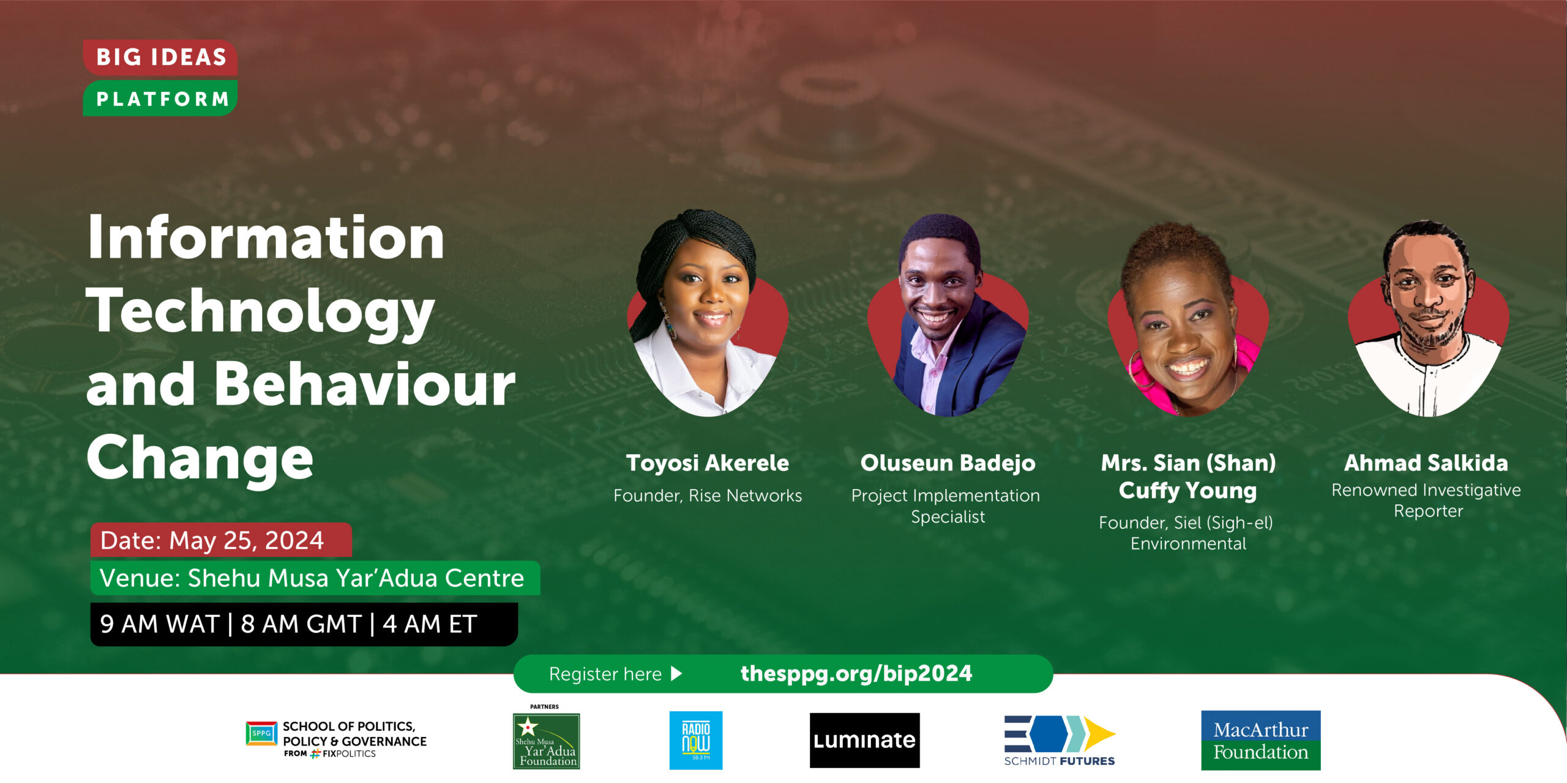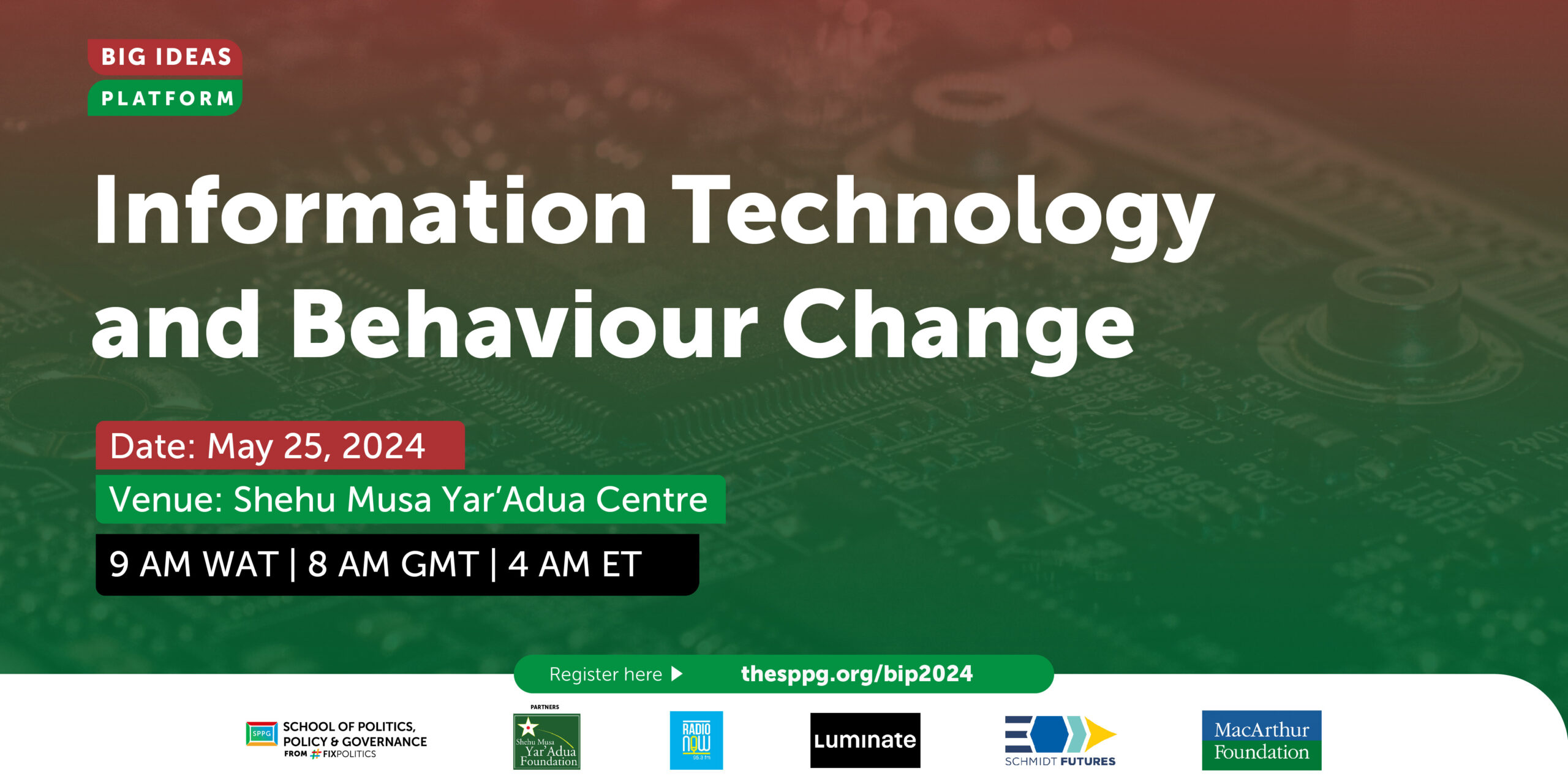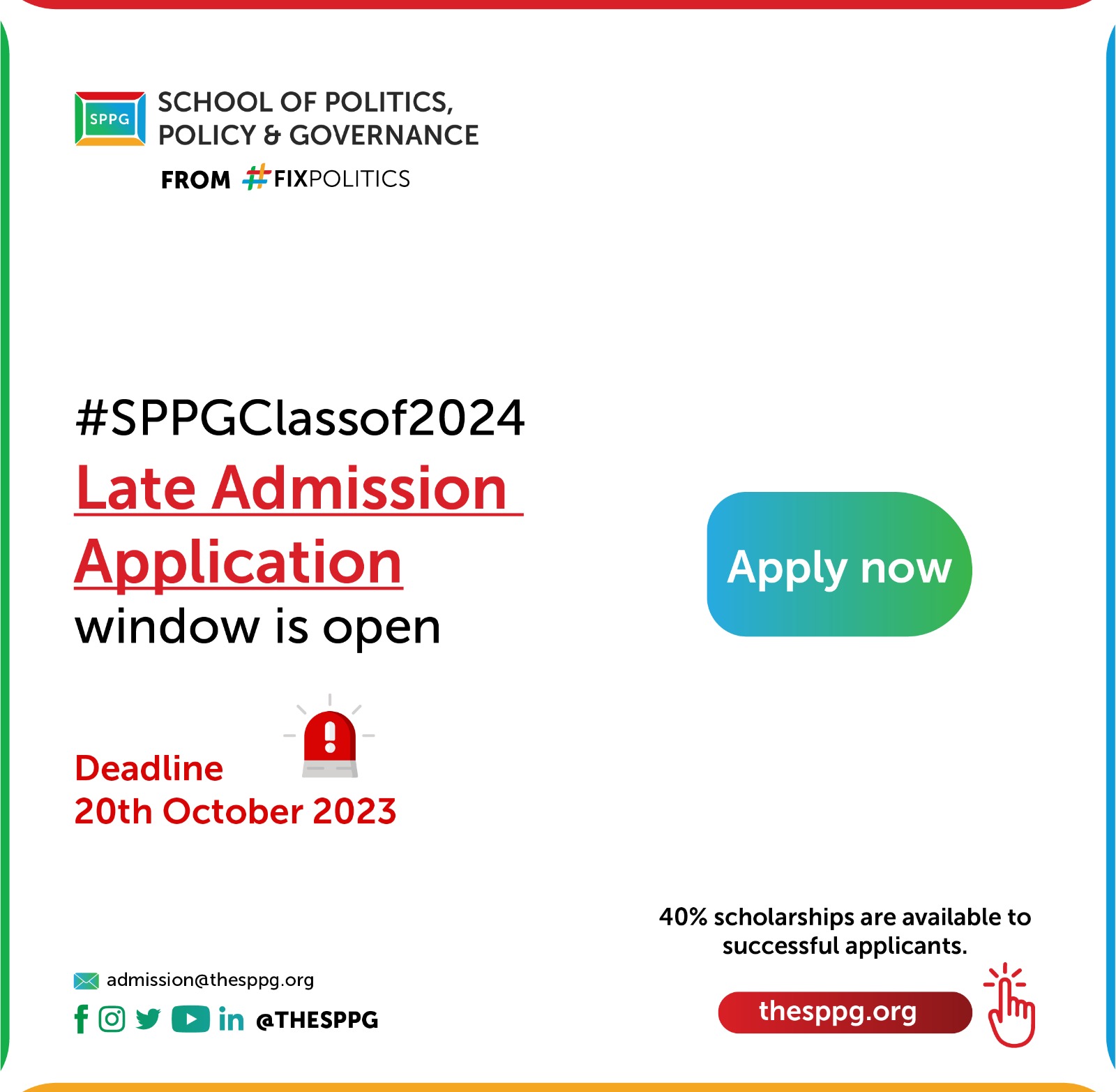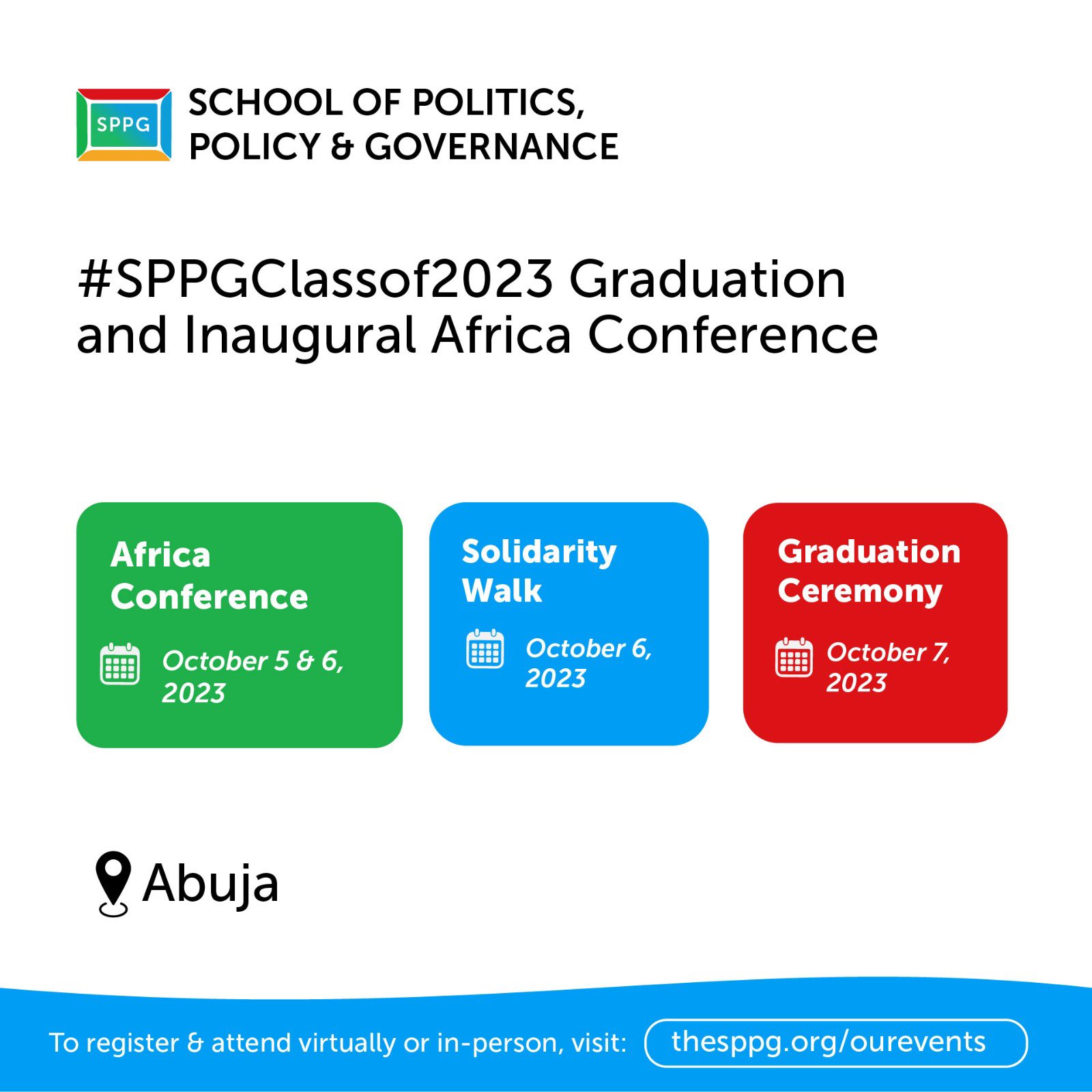SPPG Launches #JoinPolitics Campaign to Inspire Nigeria’s Professionals to Lead
Admissions Open for the Class of 2026 – Apply Now
Abuja, Nigeria - The School of Politics, Policy, and Governance (SPPG) is an unconventional school designed to attract, develop and produce a new generation of political leaders who will listen and serve the new class of citizens who know their rights.
In line with this mission, the school has officially launched the #JoinPolitics campaign, a bold initiative urging technocrats, professionals, and values-driven leaders to step into the political arena and drive meaningful governance reform in Nigeria. With applications now open for the SPPG Class of 2026, this campaign calls on the nation’s best and brightest to replace the compromised ruling class and restore integrity to governance.
A world-class academic education initiative, the SPPG is designed as a 21st century Disruptive Thinking Leadership program to train 10000 new political leaders in five years who will run for elective offices at State and Federal levels in legislative and executive offices, thus presenting the electorate with top quality choices of candidates. These leaders will form the massive base and pipeline of a new and Disruptive thinking political class, known for their Values-Driven Character, Unquestionable Competence and Undeniable Capacity.
The Urgent Call to Action: Why #JoinPolitics Matters
Dr. Obiageli “Oby” Ezekwesili, Founder & Chair of SPPG, highlighted the root cause of Nigeria’s leadership failure and why professionals must step up to fix it:
“Poor governance is the direct outcome of a leadership pipeline that has prioritised personal ambition over public service. A nation cannot thrive when those in power lack the character to lead with integrity, the competence to make informed, evidence-based decisions, and the capacity to drive meaningful change. If we do not intentionally develop a new class of leaders anchored in these values, Nigeria will continue to suffer the consequences of poor governance.”
The SPPG is that pipeline equipping leaders with the right knowledge, network, and values. We are committed to ensuring that Nigeria’s governance system is led by competent, ethical, and accountable individuals.
Speaking on the campaign, Alero Ayida-Otobo, CEO of SPPG, emphasised the critical role professionals and technocrats must play in fixing Nigeria’s leadership crisis:
“For decades, Nigeria’s governance structures have been hijacked by individuals who lack the character, competence, and capacity to lead. Meanwhile, our country boasts some of the most brilliant professionals - doctors, engineers, economists, entrepreneurs - who have excelled globally but remain absent from politics.
It is time for these technocrats to wake up, step forward, and lead. Your expertise is needed in governance, not just in boardrooms or the private sector. If the best of us refuse to engage, the worst of us will continue to rule. The time to act is now.”
At its core, SPPG exists to bridge Nigeria’s leadership gap by developing ethical, capable, and transformative leaders who will drive systemic change.
Dr. Abiola Akiyode-Afolabi, Dean of SPPG Nigeria, reinforced this mission:
“Through our unconventional curriculum, we instill integrity, empathy, and accountability, ensuring that our graduates make ethical decisions in leadership. With intensive academic training and hands-on learning from our stellar faculty, we equip our students with the expertise and skills to navigate Nigeria’s complex political and governance landscape.”
The SPPG Class of 2026 offers a rigorous, unconventional 10-month curriculum designed to prepare professionals for leadership in governance. Taught by world-class faculty and enriched by a strong Network of SPPG Public Leaders, the programme provides practical skills, real-world political strategies, and access to a supportive ecosystem of like-minded changemakers.
Who Should Apply?
SPPG invites visionary professionals who are ready to transition into political leadership. Ideal candidates include:
- Technocrats and Industry Leaders – Engineers, economists, lawyers, doctors, and business executives ready to apply their expertise to governance.
- Public Service Enthusiasts – Individuals eager to drive policy reforms, shape governance, and champion democratic accountability.
- Aspiring Political Leaders – Those interested in running for office or securing key positions in governance to restore national trust and effective leadership.
Application Details and Deadline
- Apply Now: Visit https://nigeria.thesppg.org/apply
- Deadline: August 31, 2025
- Scholarships: 40 to 100 percent (terms and conditions apply)
What You Need to Apply
- Academic qualification (B.Sc, BA, or HND)
- Master’s or postgraduate certificate (if applicable)
- Personal Statement (Maximum 750 words)
- Curriculum Vitae (Maximum 2 pages)
- Two referees who must have known the applicant for at least 12 months
- Short Bio (Maximum 300 words)
About SPPG
The School of Politics, Policy, and Governance (SPPG) is an unconventional school designed to attract, develop and produce a new generation of political leaders who will listen and serve the new class of citizens who know their rights. Founded in 2020, SPPG has already graduated four cohorts of competent leaders, many of whom are actively shaping the country’s political and governance landscape.
For media inquiries, interviews, or further information, please contact:
- Email: info@thesppg.org
- Website: https://nigeria.thesppg.org
- Follow the conversation online: #JoinPolitics | #TheSPPGAdvantage
Big Ideas Platform 2024: Recap of the Bold Ideas for Africa's Renaissance
[Abuja – May 25, 2024] – The School of Politics, Policy, and Governance (SPPG), in partnership with the Yar’Adua Foundation and MacArthur Foundation, hosted the Big Ideas Platform 2024 on Saturday, May 25, at the Shehu Musa Yar’Adua Centre in Abuja. The event, themed ‘Information Technology and Behavior Change’ centred on leveraging technology and socio-behavioural programming as ‘game changers’ for Africa's transformation.
The event kicked off with an opening remark by the CEO of SPPG, Alero Ayida-Otobo “Technology is truly a game changer, playing a pivotal role in addressing significant developmental challenges across sectors in Africa: Communication, Commerce, Medicine, Education, Security, Food Production, and so much more." The platform spotlighted four subthemes - blockchain technology, environmental awareness, virtual reality, and artificial intelligence (AI) - and had four of Africa’s bright minds share their big ideas.
Four Big Ideas Curators
Oluseun Badejo, project implementation specialist and team lead of the SPPG Blockchain Project shared his big idea on deploying blockchain technology deployment in the educational sector to address critical issues like certificate forgery, data alteration, and ensure that academic records are secure, accessible, authentic, and verifiable by employers and academic institutions without the hassle of running back to your alma mater each time your academic records are requested, scratch the traditional filing of academic records which takes time to find and has resulted to people losing academic and professional opportunities. This technology could be revolutionary in addressing the rampant issue of fake transcripts in Nigeria and across Africa. This will offer a secure and cost-effective solution for verifying academic credentials.
Speaking in a session on waste management tools, Sian Cuffy Young, an award-winning waste management consultant, educator and social entrepreneur, and founder of Siel (Sigh-el) Environmental, a highly successful social enterprise that revolutionises waste perception and practices for individuals and businesses, shared her big idea on how to create environmental awareness in children, educate them so they can make informed environmental choices. She emphasised that effective environmental change begins with an individual commitment to sanitise our environment as a personal responsibility. Her big idea cites the ‘innovative use of educational books and animations targeted at younger generations to underscore the need for teaching practical waste management skills early’. This focus on proactive methods over interventionist awareness campaigns will drive lasting environmental change.
Sabiqah Bello, representing Ahmad Salkida, the CEO of HumanAngle, a niche media platform using virtual reality to humanise Africa’s conflict, humanitarian, and development issues to evoke empathy, talked about their groundbreaking exploration of virtual reality (VR) in journalism. Offering a glimpse into the future of digital storytelling, the session illustrated VR's ability to immerse viewers in the lived experiences of others, enhancing empathy and understanding. For journalists, VR technology represents a powerful tool for conveying emotional and impactful narratives, potentially transforming the framing and dissemination of news stories.
Toyosi Akerele-Ogunsiji, Technology Education Professional, and Founder of Rise Networks and Passnonwnow, shared her big idea highlighting the critical role of artificial intelligence (AI) for information verification in today’s data-heavy world. Akerele emphasised AI's capacity to identify false reports, a key factor in combating misinformation. She also stressed the importance of integrating AI courses into educational curricula to prepare Africa’s growing population of AI users. By investing in AI, Africa can enhance its global competitiveness, ensuring that students and professionals are equipped with the necessary skills to utilise AI effectively.
Here's a critical commentary by Toyosi Akerele-Ogunsiji on AI
The VillageSquare Conversation
But beyond these big ideas, there was a question of how to scale them to transform Africa and build a better future. Dr Amina Salihu, the Deputy Director Africa Office of the MacArthur Foundation, pioneer Dean of SPPG and the lead of SPPG’s thought-leadership, led this conversation during The VillageSquare Conversation. Ajibola Amzat, a Nigerian investigative journalist, pointed out that technology can be useful but can be used as a weapon the other way round. Prof Remi Sonaiya, Nigerian politician and educationalist, and one-time presidential candidate, cited that the real challenges we face involve the ethical use of technology. She warned that technology, like a knife, can be a tool for good or harm and that the focus should be on the ethical dimension, character, competence, and capacity. However, Frank Nweke Jnr, a Nigerian Politician, Entrepreneur, Teacher and Social Innovator, and two-time Federal Minister cautioned that Africa is not represented in discussions on the global agenda regarding artificial intelligence. He added that the world will continue to have needs, and those with artificial intelligence expertise will be crucial in meeting them. On the other hand, Dr Obiageli ‘Oby’ Ezekwesili, Founder and Chair of the #FixPolitics, shared her concerns that it is the rate of the dearth of ideas that distinguishes one country from the other, one continent from the other, and reaffirmed SPPG’s determination to ensure that these big ideas will give resultant transformation in our continent.
The 2024 Big Ideas Platform proved to be an enlightening experience that offered attendees and uptakers a wealth of knowledge on the transformative potential of technology in addressing some of the continent's most pressing issues.
As the event concluded, it was clear that the big ideas, insights, and innovations presented hold significant promise for driving positive change in Africa. The 2024 Big Ideas Platform successfully highlighted the critical intersection of technology and development, leaving attendees eager to take action for social impact across Nigeria and the broader African continent.
Join us, let's co-create the Africa we need.
About the Big Ideas Platform: The Big Ideas Platform is a thought leadership initiative developed by the School of Politics, Policy, and Governance. With a focus on empowering African innovators and amplifying their voices, this platform aims to promote dialogue, collaboration, and action to address the pressing challenges faced by African communities. By highlighting transformative ideas, the Big Ideas Platform strives to facilitate inclusive growth, development, and the realization of the African Renaissance.
The Use of Artificial Intelligence in Detecting Fake News - #BigIdeasPlatform2024isHere
The spread of fake news has become a serious issue in today's digital age and challenges the foundation of our information society. In the modern day of social media rapid communication, the spread of false or misleading information disguising it as trustworthy journalism has achieved unmatched popularity. Fake news is a powerful force that affects all facets of our lives because it is so simple to generate false narratives and spread them to a large audience. The effects of fake news are severe and widespread, whether they involve politically driven misinformation efforts, sensationalised health claims, or false financial news.
The adverse effects of fake news are many and serious. It undermines people's confidence in trustworthy information sources and makes them doubtful of mainstream media and reputable institutions. The foundation of an educated society is being undermined by this lack of trust, creating uncertainty and false information. Fake news has the ability to sway public opinion, stir up anxiety, and even have an impact on important decisions like political elections. The democratic process is seriously endangered by the use of disinformation to manipulate public opinion. Therefore, the capacity to recognize fake news is crucial. It not only helps people make informed decisions, but it also protects the integrity of our information environment.
Advancements in Artificial Intelligence (AI) have significantly simplified daily human activities. Developed by OpenAI, the Chat Generative Pretrained Transformer (ChatGPT) serves as an example of these AI technologies. ChatGPT operates as a text-based conversational agent, providing textual responses to user queries. AI algorithms have been shown to be useful in detecting fake news or misinformation that may be interfering with efficiency and optimization. Proponents of using AI in the detection of fake news suggest that certain principles need to be followed, including the development of strategies by software designers to combat fake news, enabling software users to report fake news when detected, and keeping users informed of the dissemination of fake news. For example, deep learning, machine learning, and natural language processing can extract text- or image-based cues to train models to aid in the prediction of the authenticity of news. Alternatively, AI can be used to examine the social context of the news article, including features of the poster, such as the number of shares or retweets of the post. However, Generative AI tools like ChatGPT can also facilitate the spread of misinformation or fake news to the detriment of those seeking information on virtually any topic, particularly health, finances, and politics. In extreme cases, the spread of misinformation through the use of AI-generated videos or written content can set factions against one another, with violence.
The prevalence of large language models like ChatGPT in various domains, from healthcare to information dissemination, is undeniable. While they show promise in democratizing access to information and aiding in research, ethical and accuracy-related challenges loom large. Notably, the models’ capacity for generating misleading or false information raises ethical concerns, such as in the realm of fake news generation. The consequence extends from eroding trust in AI systems to affecting user perceptions, as corroborated by empirical studies. Additionally, personal harm can befall users as misinformation about health and finances, among other things, is generated and disseminated. Data ownership, user consent, and representational bias are additional layers of complexity in this discourse. Therefore, it is crucial to address these issues comprehensively for the responsible and equitable application of these potent tools in diverse sectors.
In our battle against the trend of fake news on social media, Artificial Intelligence offers powerful tools for mitigating the spread of misinformation, but its deployment must be accompanied by careful consideration of ethical, societal, and technical implications. Understanding fake news is as convoluted as understanding human behaviour. Consequently, fighting it requires multifaceted strategies. Considering that the technology that counters fake news is the same technology that created it, neutralizing it may take more than just the expertise of top tech companies. The potential methods of detection and neutralization through AI form the basis of the discussions that we will be having at the Big Idea Platform 2024.
In 2023, The School of Politics, Policy & Governance (SPPG) partnered with the Shehu Musa Yar’Adua Foundation to launch the inaugural Big Ideas Platform, centered around "Reawakening the African Renaissance: Pathways to Inclusive Growth and Development." Five innovative African leaders shared groundbreaking ideas aimed at improving African communities' quality of life. This year, The School of Politics, Policy & Governance (SPPG) is excited to announce Big Ideas Platform 2024, in collaboration with the Shehu Musa Yar’Adua Foundation, on May 25th, 2024. This year's theme, "Information Technology and Behaviour Change," will convene intellectuals, policymakers, technocrats, and changemakers to discuss transformative ideas and solutions for Africa's inclusive prosperity and sustainable development.
The event is open to the public, and registration is free. It will be a great opportunity to learn from thought leaders and professionals about how Artificial Intelligence can be harnessed not only to combat fake news but also to improve Africa's economy and enhance its development.
Date: May 25, 2024 (Africa Day)
Time: 9:00 AM – 12 PM WAT (GMT+1)
Venue: Shehu Musa Yar'Adua Center, Abuja/ Zoom
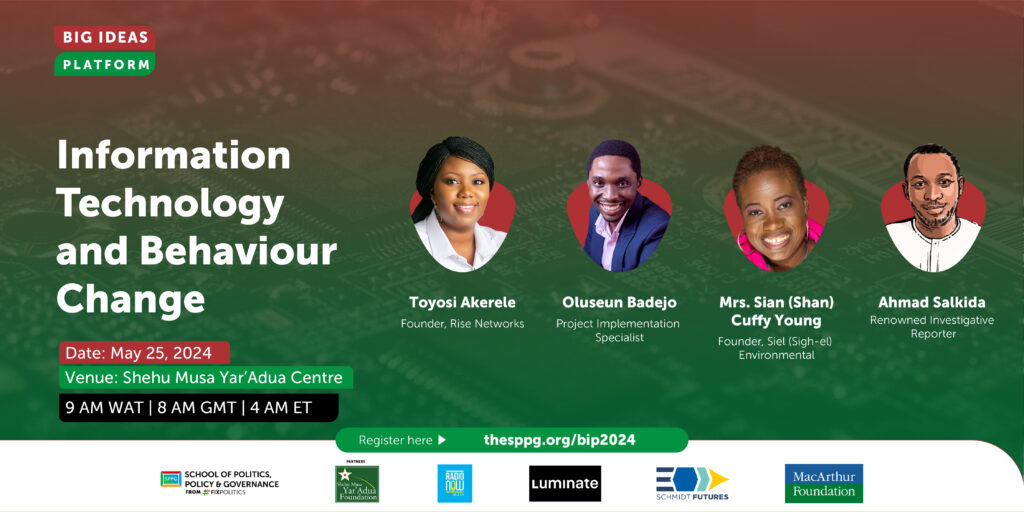
Click Here to register for #BIP2024 and stay up to date with event updates.
The Use of Virtual Reality In Addressing Challenges - #BigIdeasPlatform2024isHere
With the rapid technological advancements in recent decades, Virtual Reality (VR) has been increasingly adopted as a transformative technology with the potential to address various challenges across diverse fields. Virtual reality (VR) can be defined as an environment-building technology that enables participants to immerse themselves in their surroundings and interact with the elements. However, a broader definition of VR also includes non-immersive and semi-immersive virtual environments, such as desktop VR. This technology has gained popularity, with the market size projected to reach $62.1 billion by 2027. Previously, its use was mainly associated with entertainment and gaming, but the technology has also seen immense success in health care for training in complex procedures such as surgery, in the mining industry to simulate emergency situations, and in the automotive industry to improve driving and reduce accidents. The use of VR for training has seen immense growth because it provides an interactive learning environment that is both engaging and fun. For most people, it is something they do not use at home, so the experience is a major boon for the engagement of a workforce that would have previously experienced many different, conventional training programs.
One significant application of VR is in the fields of healthcare and education where the technology has transformed learning methods by providing immersive and interactive experiences. In the healthcare field, surgical simulators are used to enable trainee surgeons to practice procedures in a realistic virtual environment, reducing the learning curve and enhancing patient safety. VR experiences have been utilized to alleviate pain and discomfort during medical procedures, enhancing patient comfort and reducing reliance on traditional analgesics. In the field of education, VR simulators have been used to explore pivotal moments in history which enhances student engagement and retention. VR-based language learning applications also facilitate language acquisition through immersive cultural experiences and interactive exercises.
These diverse virtual training offer many advantages over traditional learning, which, even with engaging presenters, tends to rely on PowerPoint presentations that can be unappealing and reduce engagement. With a training program enhanced by VR, there is less training material required and the trainer’s time is reduced, making VR training convenient and easy to provide multiple times. Simulations in VR allow for mistakes to be made without experiencing the consequences, providing opportunities to try different ways of working and explore improvements, especially in activities that relate to emergency situations. For sequential activities, the repetition of the tasks in VR provides a safe environment to practice, increasing information retention and instilling confidence in the trainee to carry out the task in the real world. VR training is proving to be very cost-effective, as it brings the site to the trainee, eliminating the cost challenges that come with travel.
While the benefits and advantages of deploying this technology in enhancing training programs within different fields, there are certain ethical concerns that need to be addressed to fully maximise its effectiveness. The ethical concerns associated with VR technology are multi-faceted. One concern is addiction, where users may become excessively absorbed in virtual environments, which is detrimental to mental health. There is also a fear that virtual crime could escalate and become more prevalent in society, leading to confusion about what constitutes a real-world crime versus a virtual one. Another concern is the use of VR technology in various industries, such as military and defence, healthcare, and entertainment. The ethical implications of using VR in these industries are varied, ranging from the potential for creating more realistic and practical training scenarios to the possibility of exploiting vulnerable populations or exposing sensitive information. Additionally, there are privacy concerns surrounding VR technology. As users enter virtual environments, data is collected and stored on their actions, preferences, and behaviours. This personal data may be used to manipulate users and influence their actions, as seen in targeted advertising.
Despite these concerns, the future of VR appears promising, with ongoing advancements in hardware, software, and content development. These opportunities form the basis of the discussions that we will be having at the Big Idea Platform 2024.
In 2023, The School of Politics, Policy & Governance (SPPG) partnered with the Shehu Musa Yar’Adua Foundation to launch the inaugural Big Ideas Platform, centered around "Reawakening the African Renaissance: Pathways to Inclusive Growth and Development." Five innovative African leaders shared groundbreaking ideas aimed at improving African communities' quality of life. This year , The School of Politics, Policy & Governance (SPPG) is excited to announce Big Ideas Platform 2024, in collaboration with the Shehu Musa Yar’Adua Foundation, on May 25th, 2024. This year's theme, "Information Technology and Behaviour Change," will convene intellectuals, policymakers, technocrats, and changemakers to discuss transformative ideas and solutions for Africa's inclusive prosperity and sustainable development.
The event is open to the public, and registration is free. It will be a great opportunity to learn from thought leaders and professionals about how Virtual Reality can be harnessed not only to across diverse industries but also to improve Africa's economy and enhance its development.
Date: May 25, 2024 (Africa Day)
Time: 9:00 AM – 12 PM WAT (GMT+1)
Venue: Shehu Musa Yar'Adua Center, Abuja/ Zoom
Click Here to register for #BIP2024 and stay up to date with event updates.
Join us, let's co-create the Africa we need.
Unveiling the Impact of Blockchain Technology on the Educational System: #BigIdeasPlatform2024IsHere
Blockchain is a revolutionary technology that has the potential to revolutionise various industries, including finance, supply chain management, healthcare, and education. Its decentralised, secure, and transparent nature makes it ideal for use in industries where trust, security, and efficiency are of paramount importance. The integration of blockchain technology into the education system has the potential to greatly improve the efficiency, security, and credibility of the educational process. By creating secure and transparent platforms for tracking and verifying students’ academic achievements, blockchain technology can help to create a more accessible and trustworthy education system, making it easier for students to showcase their skills and knowledge to potential employers.
One of the primary benefits of blockchain in education is the creation of a tamper-proof and secure digital transcript. This transcript can store a student’s academic history, including grades, certifications, and other achievements, in a decentralised and secure manner. This can eliminate the need for traditional paper-based transcripts, which can be easily lost, damaged, or tampered with. Another potential benefit of blockchain in education is the creation of a centralised platform for the issuance and verification of digital credentials. This can greatly simplify the process of obtaining and verifying academic credentials, as it eliminates the need for intermediaries to validate them. Additionally, the secure and transparent nature of blockchain can help to prevent fraud, as it provides a reliable and tamper-proof record of a student’s achievements.
Another area where blockchain can have a significant impact is in the area of online education. By incorporating blockchain technology into online learning platforms, educators can create secure and trustworthy systems for delivering and tracking online courses and certifications. This can help to improve the credibility and recognition of online education, making it a more attractive option for students and employers alike. Starting with the general idea, blockchain is a revolutionary technology with the potential to revolutionise various industries, including education. By creating secure and transparent platforms for tracking and verifying students’ academic achievements, blockchain technology can help to create a more accessible and trustworthy education system, making it easier for students to showcase their skills and knowledge to potential employers.
One of the primary challenges hindering the widespread adoption of blockchain in education is the perceived technological complexity. Implementing blockchain-based solutions requires expertise in distributed systems, cryptography, and smart contract development, which may be beyond the capabilities of many educational institutions. Additionally, the regulatory and legal landscape surrounding blockchain technology is still evolving, posing uncertainties and compliance challenges for educational stakeholders. Concerns related to data privacy, intellectual property rights, and jurisdictional issues need to be addressed to ensure the lawful and ethical use of blockchain in education.
Despite these challenges, the integration of blockchain technology holds immense promise for transforming the educational system into a more transparent, secure, and efficient ecosystem. The potential of incorporating this technology into the educational sector in Africa forms the basis of the discussions that we will be having at the Big Idea Platform 2024.
In 2023, The School of Politics, Policy & Governance (SPPG) partnered with the Shehu Musa Yar’Adua Foundation to launch the inaugural Big Ideas Platform, centred around "Reawakening the African Renaissance: Pathways to Inclusive Growth and Development." Five innovative African leaders shared groundbreaking ideas aimed at improving African communities' quality of life. This year , The School of Politics, Policy & Governance (SPPG) is excited to announce Big Ideas Platform 2024, in collaboration with the Shehu Musa Yar’Adua Foundation, on May 25th, 2024. This year's theme, "Information Technology and Behaviour Change," will convene intellectuals, policymakers, technocrats, and changemakers to discuss transformative ideas and solutions for Africa's inclusive prosperity and sustainable development.
The event is open to the public, and registration is free. It will be a great opportunity to learn from thought leaders and professionals about the Use of Blockchain Technology In The Educational System.
Date: May 25, 2024 (Africa Day)
Time: 9:00 AM – 12 PM WAT (GMT+1)
Venue: Shehu Musa Yar'Adua Center, Abuja/ Zoom
Click Here to register for #BIP2024 and stay up to date with event updates.
The Use of Learning tools to Build awareness of Waste Management: #BigIdeasPlatform2024isHere
Solid Waste Management is a multifaceted problem comprising political, socioeconomic, institutional, and environmental aspects. Due to exponential urban growth, it has become one of the most significant issues faced by urban spaces in developing countries. The gap in environmental knowledge among the youth and the old within developing countries contributes to ecological issues or waste management problems, resulting in unsustainable development, with important consequences in low-income countries. Most of the low/middle-income countries are unable to provide effective waste management collection services because of resource constraints, lack of facilities including vehicles, and infrastructure, improper route planning, lack of technical know-how, and inadequate environmental education and awareness. To sustain SW or environmental issues in developing countries, formal education for sustainable development is essential at all levels of education, able to trigger a whole societal transformation. For better environmental sustainability or waste management sustainability education, teachers with the right knowledge, attitude, skills, and innovation, are required.
Awareness plays a pivotal role in shaping individual behaviours and attitudes towards waste management. Lack of awareness often leads to improper disposal practices such as littering, illegal dumping, and indiscriminate waste disposal, exacerbating environmental degradation and pollution. Educating the public about the environmental consequences of improper waste disposal and the benefits of adopting sustainable practices is crucial for fostering responsible behaviour and promoting a culture of waste reduction and recycling. Learning tools, including educational programs, digital applications, and interactive platforms, offer effective means of disseminating information and engaging individuals in waste management initiatives. Educational programs conducted in schools, communities, and workplaces provide structured learning experiences that raise awareness and promote sustainable waste practices among participants. Digital applications and online platforms offer interactive tools and resources, allowing users to access information, track their waste footprint, and participate in recycling programs conveniently.
The search for improved environmental quality has driven several governments in developing nations to adopt the use of Environmental Education in improving the attitude and behaviour of its citizenry towards waste management. One could ask what is the behaviour of undergraduate students towards waste management in Nigeria. Waste management behaviours are all attitude, disposition and perception towards properly disposing of waste in any environment one finds himself. Waste management behaviour includes open dumping, careless attitude towards properly disposing of institutional waste like food wrappers, torn books or papers, hotel food remains, vegetable remains etc. A degraded environment can only offer a degraded quality of life. If we really desire to sustain and improve upon the present quality of life, then it is the collective responsibility of every living human being to secure the quality of the environment.
It has been repeatedly emphasized that there is an irrepressible need for entrenching Environmental Education as a leading approach to solving environmental problems and creating a sustainable society. The poor as well as the affluent are equally vulnerable to environmental damage. The poor and poverty-stricken people, wherever they may live, are generally preoccupied with the issue of physical survival. They lack money, skills and knowledge and therefore oftentimes, tend to over-utilise local resources beyond sustainable levels. They, therefore, need to be empowered to be able to control their resources and therefore their lives according to the tenets of a sustainable, safe and clean environment for healthy living in society.
The implementation of these learning tools to facilitate Environmental Education faces several challenges, including limited access to technology and cultural differences. Additionally, sustaining public interest and engagement in long-term waste management initiatives requires continuous efforts and resources. These implementation methods and challenges form the basis of the discussions that we will be having at the Big Idea Platform 2024.
In 2023, The School of Politics, Policy & Governance (SPPG) partnered with the Shehu Musa Yar’Adua Foundation to launch the inaugural Big Ideas Platform, centered around "Reawakening the African Renaissance: Pathways to Inclusive Growth and Development." Five innovative African leaders shared groundbreaking ideas aimed at improving African communities' quality of life. This year , The School of Politics, Policy & Governance (SPPG) is pleased to announce Big Ideas Platform 2024, in collaboration with the Shehu Musa Yar’Adua Foundation, on May 25th, 2024. This year's theme, "Information Technology and Behaviour Change," will convene intellectuals, policymakers, technocrats, and changemakers to discuss transformative ideas and solutions for Africa's inclusive prosperity and sustainable development.
The event is open to the public, and registration is free. It will be a great opportunity to learn from thought leaders and professionals about how we can Use of Learning tools to Build awareness of Waste Management.
Date: May 25, 2024 (Africa Day)
Time: 9:00 AM – 12 PM WAT (GMT+1)
Venue: Shehu Musa Yar'Adua Center, Abuja/ Zoom

Click Here to register for #BIP2024 and stay up to date with event updates.
About the Big Ideas Platform: The Big Ideas Platform is a thought leadership initiative developed by the School of Politics, Policy, and Governance. With a focus on empowering African innovators and amplifying their voices, this platform aims to promote dialogue, collaboration, and action to address the pressing challenges faced by African communities. By highlighting transformative ideas, the Big Ideas Platform strives to facilitate inclusive growth, development, and the realization of the African Renaissance.
Big Ideas Platform 2024 to Spotlight Bold Ideas in Information Technology and Behaviour Change for Africa's Development
[Abuja – April 22, 2024] – The School of Politics, Policy & Governance (SPPG) in partnership with Shehu Musa Yar’Adua Foundation debuted the first edition of Big Ideas Platform in 2023 under the broad theme of "Reawakening the African Renaissance: Pathways to Inclusive Growth and Development". Five dynamic citizens of Africa whose ideas illuminated bold solutions that can enhance the quality of life in African communities shared a platform to tell a diverse audience the story of their big idea.
This year, we are pleased to announce Big Ideas Platform 2024 in collaboration with the Shehu Musa Yar’Adua Foundation. This thought leadership initiative, taking place on May 25th, 2024, will explore the theme "Information Technology and Behaviour Change".
The event will gather leading intellectuals, policymakers, technocrats, and changemakers to engage in stimulating discussions and showcase bold ideas and disruptive solutions that can propel Africa toward a future of inclusive prosperity and sustainable development.
The Big Ideas Platform is an intellectual convergence of concepts, a marketplace of ideas, where exceptional African minds convene to engage in robust conversations. The platform will facilitate the sharing, generation, and collaboration of fresh ideas, innovative solutions, and implementation strategies to address Africa’s plethora of challenges.
Speaking at the event, Alero Ayida-Otobo, the CEO of SPPG, said, “The Big Ideas Platform is a thought leadership initiative that serves as a platform for launching new thinking, spotlighting visionary individuals, and illuminating bold ideas that have the potential to improve the lives of African communities.”
According to her, the Big Ideas Platform will serve as a catalyst for change, fostering a community of forward-thinking individuals committed to translating ideas into impactful actions that shape the continent’s future.
The Big Ideas Platform 2024 focuses on the crucial role of information technology and behaviour change in propelling Africa towards a better future.
Dr Amina, Faculty of SPPG, said, “We must remember that technology is a tool, and for a sustainable and enduring African Renaissance, we must reconsider how technology is harnessed to drive system change that benefits everyone, helping to shift behaviour from damaging to managing our scarce resources."
Key areas of focus at Big Ideas Platform 2024 will include:
- Blockchain technology: This is premised on immutable records to protect legal tender such as academic certificates and to earn revenue.
- Virtual Reality: A four-dimensional visual experience of hard-to-reach places such as conflict zones to build awareness and empathy and inform accurate urgent action.
- Artificial intelligence: Non-animate machines trained to think and act like humans for humans, for example, identifying fake news.
- Environmental Awareness: Child-centred learning tools to shift children’s understanding of waste and its management to secure wealth and the environment.
Click here to Register
Our lineup of panellists for this year’s edition includes:
Toyosi Akerele-Ogunsiji, EdTech professional and Founder of Passnownow.com; Oluseun Badejo, Team Lead of SPPG Blockchain project; Mrs. Sian (Shan) Cuffy Young, Founder of Siel (Sigh-el) Environmental; and Ahmad Salkida, Investigative Reporter.
The event is open to the public, and registration is free. It will be a great opportunity to learn from thought leaders and professionals, who have the requisite knowledge about improving Africa’s economy and enhancing its development.
Join us, let's co-create the Africa we need.
About the Big Ideas Platform: The Big Ideas Platform is a thought leadership initiative developed by the School of Politics, Policy, and Governance. With a focus on empowering African innovators and amplifying their voices, this platform aims to promote dialogue, collaboration, and action to address the pressing challenges faced by African communities. By highlighting transformative ideas, the Big Ideas Platform strives to facilitate inclusive growth, development, and the realization of the African Renaissance.
SPPG Reflects on the Big Ideas of #BIP2023 and Unveils the Anticipated Big Ideas Platform 2024
The School of Politics, Policy and Governance (SPPG), in collaboration with the Shehu Musa Yar'Adua Foundation, debuted the Big Ideas Platform (#BIP2023) on June 16, 2023 under the broad theme of "Reawakening the African Renaissance: Pathways to Inclusive Growth and Development". Five dynamic citizens of Africa whose ideas illuminated bold solutions that can enhance the quality of life in African communities shared a platform to tell a diverse audience the story of their big idea.
This pan-African intellectual convergence serves as a vibrant marketplace of ideas, bringing together exceptional minds to address the continent's challenges and chart a path towards inclusive growth and development.
Big Ideas Platform 2023: A Recap of Big Ideas of Forward-Thinking Africans Shared in 2023
Five dynamic citizens of Africa whose ideas illuminated bold solutions that can enhance the quality of life in African communities shared a platform to tell a diverse audience the story of their Big Ideas.
Here is a recap of the Big Ideas platformed in 2023:
-
Amal Hassan, Founder/CEO of Outsource Global, emphasized the significance of Business Process Outsourcing (BPO) as a pivotal economic catalyst. She underscored BPO's role in generating millions of jobs in India and highlighted Nigeria's potential to replicate this success. With robust infrastructure, a skilled workforce, and a constant influx of graduates with diverse skill sets, Hassan suggested that Nigeria has the capacity to harness BPO opportunities, cater to global demands while retaining her youths.
-
Adetola Onayemi, CEO of Norebase, highlighted the stark disparity between Africa's population share of 15% and its GDP contribution of only 3% globally. He emphasized the urgent need for strategies to bolster Africa's GDP and advocated for initiatives that not only foster continental prosperity but also contribute to the growth of global GDP, hence his big idea on Borderless Business
-
Ijeoma Akwiwu, Co-founder/COO of Pivo Africa, presented her big idea of building an end-to-end financial operating system for Africa's supply chain. Reflecting on the unprecedented challenges posed by the COVID-19 pandemic, Akwiwu underscored its profound impact on individuals and businesses, highlighting the urgent need for resilient financial systems capable of mitigating disruptions, hence her big idea.
-
Hamzat Lawal, Founder of CODE and Follow the Money, addressed the concept of "Factivism," combining activism with data-driven facts. Lawal recounted the tragic narrative of lead poisoning in Zamfara, where 700 children lost their lives and 1500 were left sick. He detailed how the #SaveBadega campaign, rooted in factivism, garnered significant attention and spurred governmental action in response to the urgent crisis.
-
Samson Ogbole, Farmer at Soilless Farm Lab, spoke on "Soilless Farming" for sustainable agriculture. Drawing attention to the aging demographic of Nigerian farmers, with an average age of approximately 60 years, Ogbole highlighted the concerning lack of interest among young people in agricultural pursuits. He emphasized the urgency of involving youths in agriculture to address the imminent challenge of an aging farming population and the adoption of soilless farming to ensure food security for the future.
These insightful discussions shed light on various critical themes, generating valuable insights and fostering a sense of shared purpose.
Big Ideas Platform 2024 is here!
[Click her to Register]
This year, our focus is on information technology and behaviour change. We invite you to join a panel of speakers addressing a diverse audience of policymakers, advocates, captains of industry, youth, schools, and community leadership on your insight. It is noteworthy to mention that this year, Toyosi Akerele, who as you know is a leading AI in public interest unicorn is a guest speaker at the Big Ideas Platform 2024.
Register now for #BIP2024 on our website: https://thesppg.org/bip2024
About the Big Ideas Platform: The Big Ideas Platform is a thought leadership initiative developed by the School of Politics, Policy, and Governance. With a focus on empowering African innovators and amplifying their voices, this platform aims to promote dialogue, collaboration, and action to address the pressing challenges faced by African communities. By highlighting transformative ideas, the Big Ideas Platform strives to facilitate inclusive growth, development, and the realization of the African Renaissance.
The late-admission application window into the #SPPGClassof2024 is open and closes on October 20 2023
The late-admission application window into the #SPPGClassof2024 is open and closes on October 20 2023
The SPPG, School of Politics, Policy and Governance, established in 2020, is building a pipeline of a new and disruptive-thinking political class with a mission to transform the quality of political and public leadership in Nigeria and the rest of Africa. The School is a unique Public Leadership Preparation initiative.
The SPPG educates present and future leaders that are committed to public good and who are ready to serve as stewards of the well-being of all Nigerians. The School delivers an unconventional multidisciplinary curriculum that is aimed at producing a massive base of ethical, competent and capable public leadership with the requisite knowledge and skills to solve complex development problems in our country and continent.
So far, SPPG has graduated 3 cohorts of students as #PioneerClassof2021 (160), #Classof2022 (133) and #Classof2023 (184). Consistent with the mission of TheSPPG.org, upon graduation, many of our students run for elective offices across various parties while others pursue leadership careers in the public and private sectors as well as civil society.
In furtherance of our mission and commitment to attracting exceptional talents and students, , we have decided to open a Late Admission Window for those who wish to apply to the #Classof2024. The deadline for applications using the Late Application Window is extremely tight and ends on October 20, 2023. Admission to the SPPG is highly competitive through a rigorous selection process conducted entirely virtually.
To apply, visit thesppg.org .
Who can apply?
- All applicants must have a minimum educational qualification of a B.Sc or HND/BA.
- Applicants must be able to demonstrate commitment to public leadership.
- The ability to demonstrate the successful execution of projects will be an advantage.
- What you need to apply
- Applicants are required to upload the following to the online application portal:
- Academic qualification (BA, B.Sc or HND).
- Master or any other Post Graduate Certificate (if applicable).
- Personal Statement (Maximum – 750 words).
- Curriculum Vitae (Maximum – 2 pages).
- Details of 2 recommenders (peer, community leader or employer who must have known you for a minimum of 6 months and can vouch for your character and suitability for this program).
Application Deadline
To fast-track the admissions process, applicants are expected to fulfil all admission requirements on or before October 20 2023.
Limited scholarship slots are available. Terms and conditions apply.
Incomplete applications (applications without recommendation letters) will be disqualified.
To learn more about the School of Politics, Policy and Governance, visit thesppg.org.
Join us for the phenomenal #SPPGClassof2023 Graduation Week
We are thrilled to invite you to join us at the School of Politics, Policy, and Governance Graduation Ceremony and Africa Conference 2023.
After a rigorous but rewarding transformative journey of 10 months, the #SPPGClassof2023 has experienced a remarkable journey of growth, invaluable knowledge exchange from our global faculty, capstone mentors, and peers, as well as outstanding accomplishments, which is why we are pleased to celebrate their steadfast dedication to transformative political and public leadership.
This year, the inaugural edition of the Africa Conference 2023 debuts as part of the graduation ceremony for #SPPGClassof2023. It promises to be a historic gathering that assembles African value-oriented governance and citizen movements to connect, learn from each other, and build a lasting network of disruptive leaders in the public space, ready to shape and influence the future of governance in their respective countries and throughout the continent.
We are excited to bring the line-up of activities marking the #SPPGClassOf2023 Graduation Event to your notice. It promises to be a remarkable experience. One you wouldn’t want to miss.
Kindly find the details below:
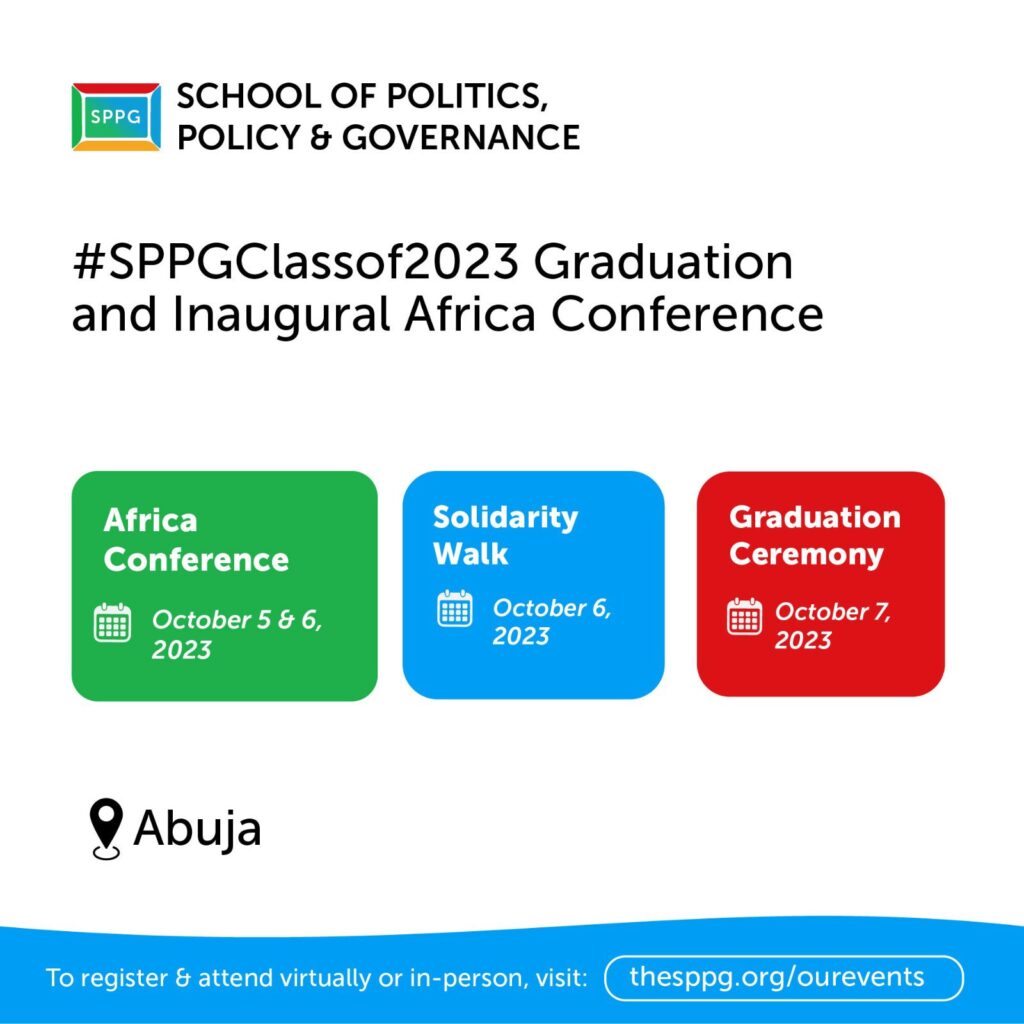
1. The Africa Conference:
https://www.youtube.com/watch?v=4Fk9QIgK2Fs
The Africa Conference will bring together disruptive political and community leaders, SPPG students and alumni, and the #FixPolitics WSG Community. We will explore the significance of citizen-led movements, their impact on African governance, and their crucial role in the continent's renaissance.
Day 1: The first day of the event will focus on the theme "Governance and Political Trends in Africa: An Overview of Citizen’s Movement and their impact
Date: October 5th, 2023
Time: 10:00 am -5:00 pm WAT
Venue: Shehu Yar’Adua Center, Abuja
Day 2: The conference continues with feedback sessions, where participants will share the outcomes of their discussions from the previous day and work towards actionable solutions.
Date: October 6th, 2023
Time: 12:00 pm- 3:30 pm WAT
Venue: Shehu Yar’Adua Center, Abuja
2. Graduation Ceremony:
https://www.youtube.com/watch?v=keO_ACb0jeU
The events will culminate in the graduation ceremony recognizing the achievements of the #SPPGClassof2023 and celebrating their journey towards becoming values-driven, disruptive leaders.
Date: October 7th, 2023
Time: 10:00 am -3:00 pm WAT
Venue: Idris .A. Abdulkadir Auditorium, National Universities Commission, 26 Aguiyi Ironsi, Maitama, Abuja.
Please RSVP for each event you plan to attend via the registration link below:
Attendance is free, but registration is compulsory.
Click here to RSVP for both events.

